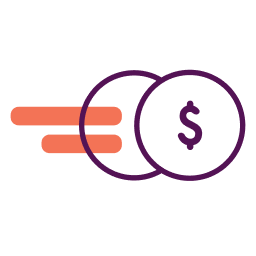Small business owners often struggle to have enough cash to cover day-to-day expenses. But there’s a problem with having too much cash in your bank account, too.
So what’s the balance? How much cash should your business have available?
What Does it Mean to Have Cash On Hand?
Having “cash on hand” refers to the cash reserves you can easily access. That could be cash in a box in your office that you use for petty cash or the money in your checking account that you could easily withdraw.
This cash can come from your cash inflow, which refers to any money coming into your business, whether that’s from clients paying invoices, a loan, or money you’ve provided yourself to fund your business.
Why Every Small Business Should Have Cash On Hand
It’s important to have cash flow and cash on hand so your business can operate smoothly. In addition to cash inflows, you also have cash outflows, which are all the things you spend money on in your business, including paying vendors, rent, utilities, and inventory. You need cash on hand to cover those expenses.
If yours is a seasonal business, cash flow may be unsteady. You may primarily operate in the summer, and the rest of the year, you may have little to no money coming in. These months, it’s especially important to have access to cash to operate.
And then there’s the ever-changing economy. Should your sales plummet, do you have enough money to cover expenses until things get better?
Determining How Much Cash Your Business Needs
So how much should you have on hand? It depends on your business’ cash needs. Start by looking at your normal operating expenses. These include what I mentioned above: rent, utilities, inventory, supplies, software subscriptions, et cetera.
Startups may have higher expenses, especially at the beginning.
Some of these expenses can be paid with means other than cash, so consider which you could pay with a credit card.
Now consider the future. Will your expenses stay the same or increase? Forecasting future costs by calculating your cash flow projection will help you understand how much cash you need to have on hand down the road.
While there’s no hard and fast rule about how much cash you should have available, generally the rule of thumb is to keep three to six months’ worth of cash on hand.
How to Increase Cash On Hand
If your expenditures are exceeding your income, it’s time to figure out how your business can keep up with the increasing financial demand. Here are some strategies to find a little extra cash.
Spend Less Cash
It’s simple. If you want more cash on hand, lower your expenses. Find ways to cut corners. Review all your expenses and determine which are unnecessary (particularly recurring subscriptions for software you may no longer use).
Increase Revenue
You can do this in several ways. You can raise your prices, sell existing customers on additional products, or offer additional products or services. The more revenue you generate, the higher your cash balances.
Lower Your Expenses
If you purchase inventory or materials from a supplier, do some research to see if you can find a better price. This will lower your costs and increase cash on hand.
How Much Cash is Too Much?
It might seem strange to say, but excess cash on hand can be a bad thing. First, if it’s sitting in your checking account, it’s not earning interest. If you don’t need it, consider moving it to a savings account.
Second, having access to a large amount of cash can be tempting to spend. Suddenly you’re eyeing that $500 office chair you don’t really need!
If your cash flow statement shows a high amount of cash on hand, that’s money that’s not being reinvested into your business.
So how much is too much? Anything over that three to six months’ worth. If you have more, consider the best way you can invest the funds back into your business.
Other Options for a Financial Safety Net
Maybe having too much cash on hand isn’t your problem. Maybe you don’t even have enough cash to pay your expenses. In that case, you have options that can provide a safety net.
You can take out small business loans, which can include bank loans, SBA loans, and short-term loans, depending on what you qualify for. Here are some options to consider:
There are also business credit cards that can help you purchase what your business needs. Look for one with rewards so you can get perks when you spend.
Your business runs on the power of cash. Staying on top of how much you have and ensuring you have enough for paying your bills should be a top priority.
This article was originally written on February 11, 2022 and updated on March 31, 2023.



Have at it! We'd love to hear from you and encourage a lively discussion among our users. Please help us keep our site clean and protect yourself. Refrain from posting overtly promotional content, and avoid disclosing personal information such as bank account or phone numbers.
Reviews Disclosure: The responses below are not provided or commissioned by the credit card, financing and service companies that appear on this site. Responses have not been reviewed, approved or otherwise endorsed by the credit card, financing and service companies and it is not their responsibility to ensure all posts and/or questions are answered.